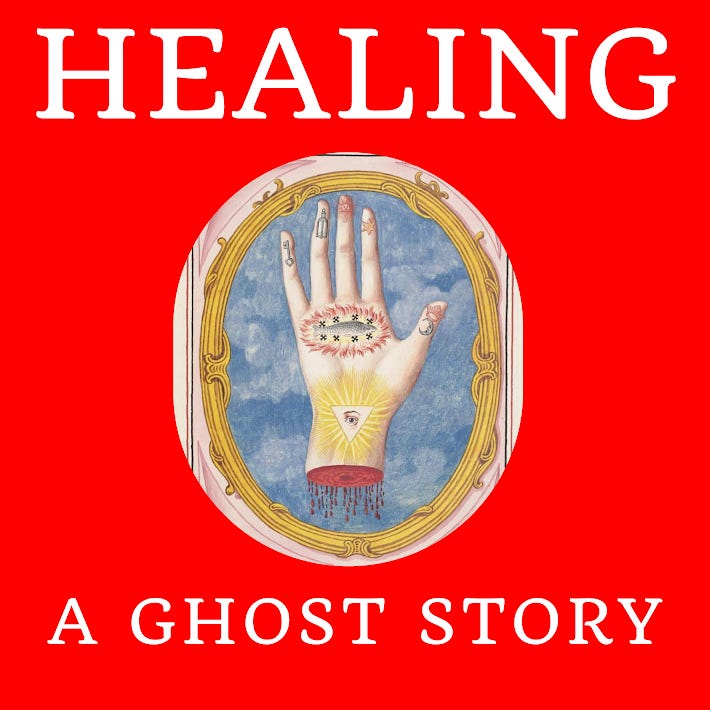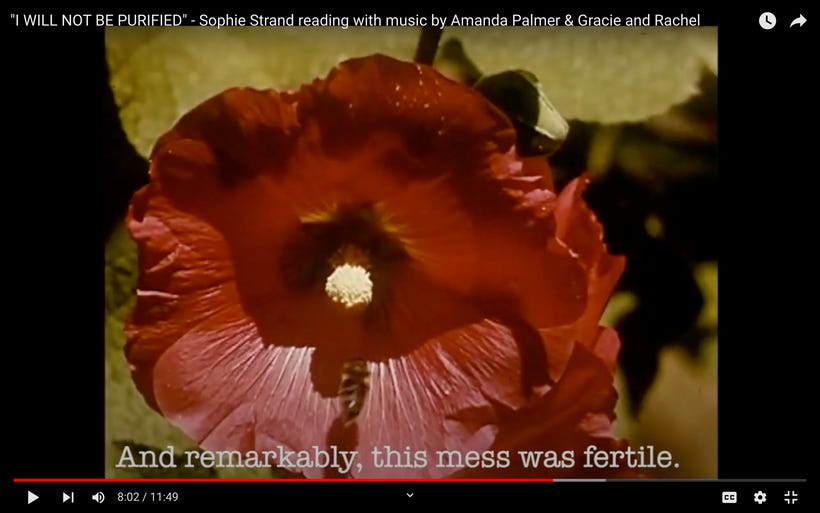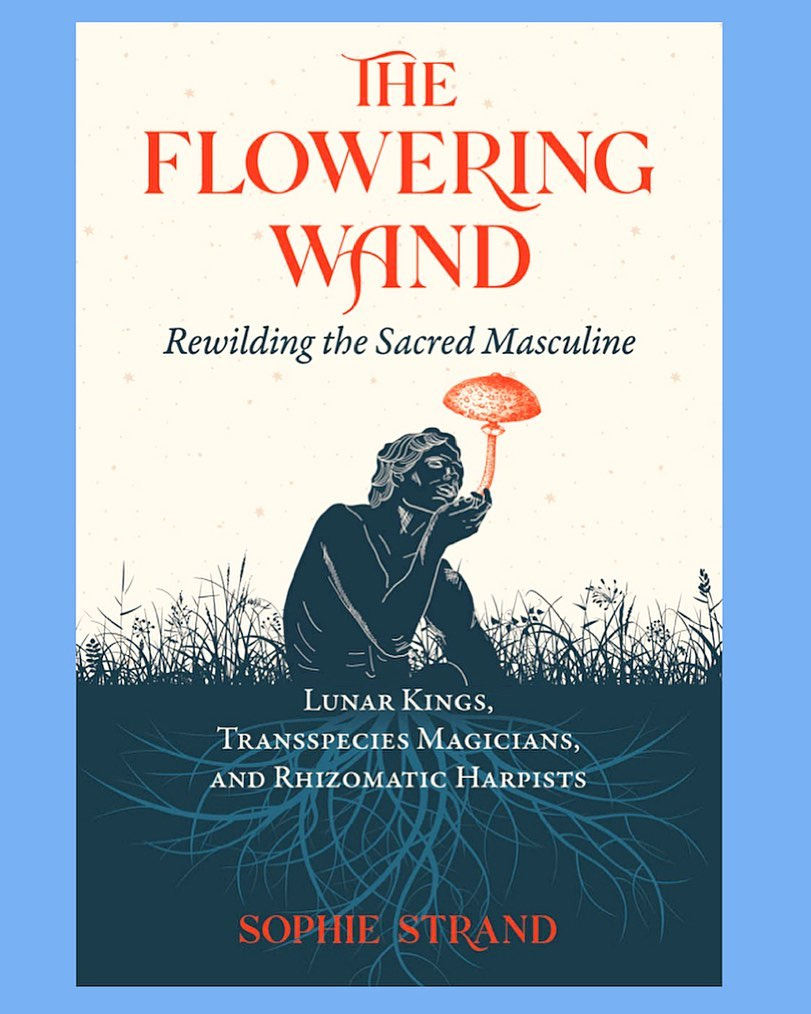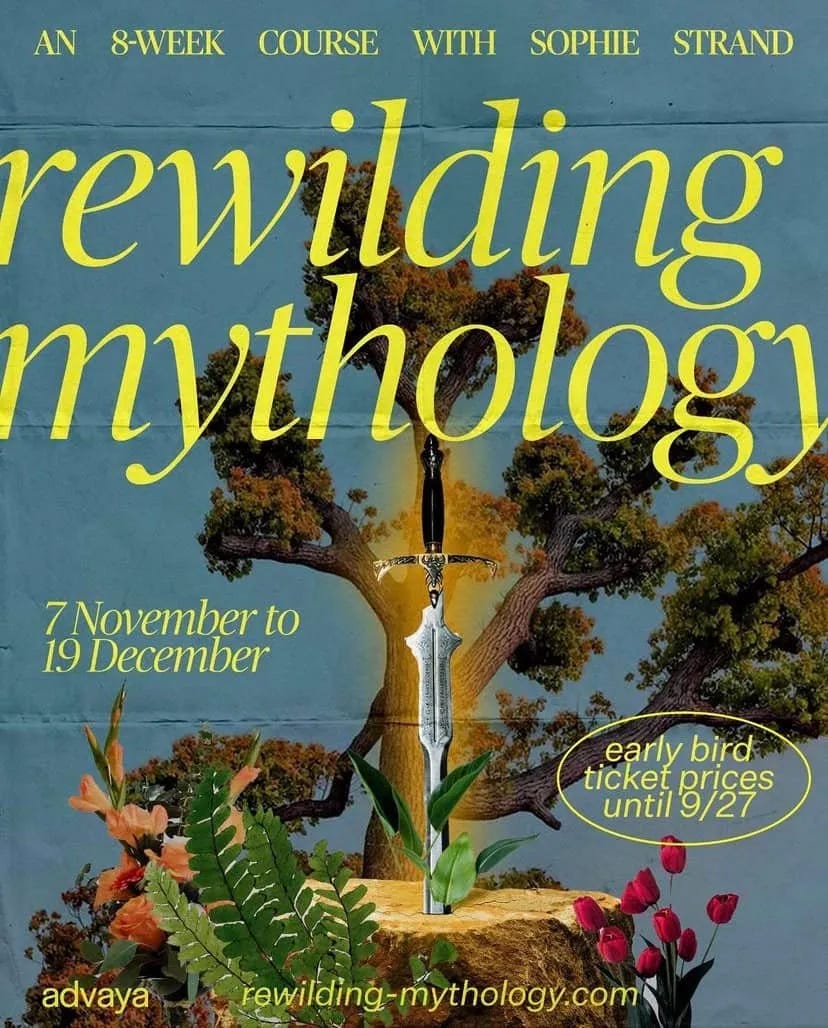Written for Bayo Akomolafe and Science and Nonduality’s Wandering, Winding Way of the Wound
Healing: A Ghost Story
The banging enters my dream before it wakes me. The thump of a woodpecker’s beak probing the oak tree. In the dream I’m in my childhood home looking down from the porch at the rotten oak, knowing the woodpecker is eating grubs out of the white rot inoculated wood. Is the tree dead if is full of so much life, so much food? Is it maybe, more alive now, full of beak wounds, teeming with grubs and threads of fungi.
Bang. Bang. The dream dissolves like snow on a hot stone and I’m out of bed, groggily peering through the door viewer at whoever is demanding entrance into my home at three in the morning.
Her face is flush, appearing pinker still in contrast to her platinum hair. Her lipstick is smudged into something resembling a scar.
“Come on! Let me in! I forgot my keys.”
“Your keys? This is MY apartment. I don’t even know you.”
And yet I recognize her. And yet I slowly open the door and let her in, gagging as I’m hit by the strong stench of saccharine alcohol and vanilla-themed perfume.
“Ugh!” She throws her bag in the corner and slams the door behind her. “It took your forever.”
But in fact, it takes me only a second to realize that this is not a stranger. This wild unceremonious invader is, although an inch taller than me, although stinking drunk, although pinker, plushier, bigger all around as if she’d received a second longer attached to the balloon pump, is most decidedly…me.
“I need carbs…now. Or I’ll be a mess tomorrow,” she’s mumbling as she begins to disassemble my kitchen drawer by drawer. I trail behind her, dumbstruck. She finds a stale box of gluten-free crackers I bought for a dinner party months before and starts to eat them without a plate, a corona of crumbs collecting around her booted feet.
“I usually take my shoes off,” I suggest but she’s cackling with her mouth full.
“I usually take my shoes off.” She parrots me in a dopey voice. “Oh, shut up with that sanctimonious bullshit. You are even less fun than I expected. Do you really only have crackers here?”
“Look. What do you need? Why are you here?”
“I need to sleep. And then I need to get this article on dating done for my boss tomorrow. And I need you to give me the space to do that,” she answers curtly.
Article on dating? What?
She eats everything in the house and then falls asleep on the sofa with her shoes still on, her antic perambulations around the apartment memorialized by muddy boot prints. She sleeps till noon the next day. Up since four, I’ve already written an essay, caught up on emails, and continued work on a book proposal. She showers for an hour, leaving the bathroom smelling like synthetic grapefruit and ovulation. Her body is so robust, so flush with brightly oxygenated blood, that it feels offensive to this quiet little corner I have cultivated. To my orchids and old books in tremulous piles.
“Why are you working so hard?” she scolds and I explain all my books, my projects, these sense of urgency my glitchy body has gifted to me.
“God. I mean… I want to write a book. Maybe I’ll go get an MFA,” she muses will clipping her nails onto the floor. “I wonder what I’ll write about.”
I’m stunned at the inability to summon a cause, a spark of creative need. I have never once wondered what to write about. I have never once felt I could defer an idea for even an hour.
It takes several days for me to realize how much she sheds. Crumbs, potato chips, tumbleweeds of hair that her long mane can spare to lose, nail filings so healthy they could be used as a mouse’s scimitar, candy wrappers, cigarette butts.
She smokes in the house the first day I leave her alone. We have a screaming match when I return. From then on, she compromises and smokes out of the window. She lives on sugar and coffee. She talks loudly to friends on the phone while I try to resolve medical debt online, try to schedule an appointment with a new nutritionist, try to get my medical records faxed from one hospital to another. When these conversations end, she tells me she hates these people. She tells me about her job writing beauty and wellness articles for online feminist magazines and how idiotic she finds her peers. Her job pays her to attend spas and wellness retreats, writing snarky tell-all reports with pastel graphics.
I try to normalize the situation given my knowledge of family systems and trauma therapy. We must include all versions of the self! We must integrate that which we have exiled and bring it back into wholeness. Is she the manifestation of my trauma? I should be empathic. I should work harder to understand her. Several weeks into her stay, I cook us a beautiful dinner. Salmon and broccoli. But she stands me up, staying out until midnight, telling me she’s reconnected with a married man she used to work for.
“Why? You’re too old for that!” I exclaim, still going to fridge to retrieve her cold dinner, getting her a glass of water. Feeling sympathy perhaps because she looks like me. She is me. “Don’t you want partnership? A family? A romantic collaborator?”
“Yuck!” She responds both to me and to the food. “I’m too young for that. I prefer having lovers. I want a life worth writing about. I’m not ready to be tied down to something yet.”
“A life worth writing about is not necessarily an easy life. It’s soothing, if unsayable, to be simple and undramatic. IT can be good be tied to something,” I try carefully, feeling my own longing uncurl and rearrange itself in my chest like a drowsy cat. “It feels good to care for other people. And to know that their care keeps you alive. It’s what trees and fungi do. It’s what animals do. We all do our best living in symbiotic community.”
Her eyes are glazed and blue with the light of her phone. “I mean, I get it. I’m really lonely.”
“Are you?” I probe. “I’m not. I guess, I long for a partner, but I feel held by all my friends.”
“I have more friends than you,” she sniffles, still not looking up from her phone. “I just don’t like them very much.”
“You never call mom or dad or Jonah. You never come with me to see the family or the cousins,” I remark.
“Oh. Yeah. Well, I’ll see them next month for the holidays. That’s enough.”
I can’t get rid of her. And I can’t clean up after her. She emits a toxic miasma of Santal 33, teenage locker room, and tobacco smoke that adheres to surfaces like cooking grease. It’s a virile smell. Loathsome. I feel as if it could impregnate your very pores with demon spawn. She watches long French movies in the living room, ashing into your monstera plant. She never cooks and yet manages to leave behind half-eaten food everywhere. She makes fun of my early bedtime, my discussions of impending environmental collapse, my friends, my exercise and physical therapy routines, my dedication to work.
I juice parsley. I watch videos about EMDR and psychedelic-assisted trauma therapy. I do a holotropic breathing session alone in my bedroom while she makes out with a shaggy-haired barista in the kitchen.
It isn’t until she steals my phone and calls my midwestern ex-fiancé and meets up with him for dinner that I really lose my shit.
“He said you were just too sick for him. Too intense. Too focused on your work,” she taunts me. “He told me you were uptight and radical and crazy.”
I narrow my eyes, finally sharpened into certainty.
“Look,” I say to her, to myself. “I know you are me. That you’re some version of me. But I’ve decided I don’t care what the trauma therapists say. I don’t think I can integrate you into my life. I don’t think this is working.”
To my surprise, she smiles, revealing polished, straight teeth.
“But I’m the person you’re trying to get back to all the time. I’m the person you’re trying to find and to remember how to be.”
The world tilts. My body, prone to postural tachycardia, knows to sit down, to lean into the vertigo rather than resist it.
“I’m confused. What do you mean?”
She sits beside me so that the comparison is unavoidable. Our bodies are mismatched tuning forks, one prong straight, the other bent, dis-harmonic. She has better posture, better color. Her skin candlelit. Her hands manicured, free of bubbled veins and tissue-paper scarring.
“Haven’t you ever wondered what you’d be like if you hadn’t been abused as a child? If you hadn’t been traumatized? Haven’t you ever wondered what you’d be like if your genetic illness had never turned on?” She draws my hand to her face, stroking her own velveteen softness with my fingers.
“I’m the Well You. I’m the Healthy You. I’m the “you” without trauma. I’m the person you could have been and could still be if you fixed yourself. If you finally worked hard enough to heal yourself.”
My veins stiffen into a vasculature of wood. I feel planted, vegetal, inhuman. My hand against her human face is not a hand. It is a sheen of mildew. The obdurate green of undergrowth. Lacquer of lichen on a tombstone.
I retract from her sunshine. Her lonely and immaculate selfhood. I retract back into the root system I shared with the many beings I depend on to keep my disabled, non-normative body alive.
“Get out.” I say. “Get out.”
“I am the healthy you. I am your wellness. I am your origin and your goal,” she insists. “If you reject me, you are rejecting healing and wholeness and abundance! You’ll never be complete!”
It takes me a long time to say it. I muster it with every microbial cell of my chimerical body as I push her towards the door.
“If this is wellness, I don’t want it. If this is healing, I refuse it.”
It takes me my whole life to realize I’ve been haunted. Not by trauma. Not by the abuse. But by the idea that there was another version of me. A well version. A normal version. An untraumatized body. A garden of Eden body free of trespass, somehow walking alongside my hobbled form, taunting me with her agility and ease.
I never considered that to be well inside systems of oppression that snare most bodies is not necessarily a marker of canniness or ingenuity. It is not necessarily a marker of good character or revolutionary verve. Or of the ability to improvise with tectonic cultural and geological shifts to come.
I want to suggest that we are all haunted. Not by flashbacks and memories. But by an imaginary idea of wholeness. By the idea that there is a normal body that renders our body deviant. That there is another version of us – a healthy version – that somehow escaped the fire, slipped loose the noose of generational trauma, violence, and illness– that we must spend our every waking hour, our hard-earned money, our dedicated spiritual and physical focus striving towards.
We do not bring in priests to exorcise this ghost. Instead, we make it our Holy Spirit. We sacrifice our lives, our time, our money, our attention at the altar of a body that never existed. A version of us we might, if we met them, not want to be.
Trauma has become akin to sin, in its original Hebraic formulation meaning “to miss the mark”. It is seen as a dead end that forks off from the straight highway. The deviation. The wrong turn. The wrong self. And the way we talk about it reveals it theological undertones. In fact, the cataphatic impulse to name everything as trauma rearticulates the medieval impulse to circumscribe god through intellectual acrobatics. Just as medieval theologians poured over scripture, seeking god, so are we paranoid readers of our own bodies, taking any symptom as a sign that might lead back to the genesis, the original traumatizing event, the god we can only see through the bubbles he creates on the surface of the ocean.
The hunger to locate and explain trauma might be a hunger for a god of matter. A god who cares little for our value dualisms, who uses our own bodies as instruments. A god big enough for the chaos and collapse to come.
We strive towards the healed body like we strive towards Eden. But as we walk towards Eden we find we are not actually waking towards a utopian garden, but into the molten wound of a crater. The Chicxulub crater to be exact, created when an asteroid hit the earth, causing an extinction event that decimated the dinosaurs and killed 75% of all life, opening up the real estate, the ecological niches, that proto-mammalian life would rush to fill. It was that crater that created the space for us to evolve and, finally, produced humanoid bodies.
We are the product not of a garden but of an impact. An extinction event. We are the children of the crater. The bodies produced by collision and eruption.
The well body and the Edenic utopia function similarly. They are advertised as universal but are always partial. They are always produced by some other being’s dystopia.
Wellness is built from unwellness. Utopia depends on and produces dystopia. Blood pressure stabilizers, diabetic drugs, and anti-depressants keep our bodies upright while also polluting river water. A medication is produced by context, and no substance we produce stays in its correct place for long. It leaks physically and ontologically, producing hells when it was created to stabilize anthropocentric normativity. All is pharamakon: contextual, leaky, slipping between potion and poison unpredictably.
For beings that date the beginning of the universe to a Big Bang, should we not expect that we feel the Bang, that original combustion the detonated hurl of body against another body, the making of bodies by slamming bodies together, in our very matter?
Collision and impact and interpenetration. Matter conjugated. This is the calculus of world building. It is also language we would readily identify as relating to trauma and trespass.
Let me ask. What unwellness is my wellness built from? What dystopias do I unwittingly produce as I fixate on my personal completion, my physical and psychic wholeness? What new shapes do I preclude when I refuse to collaborate with indigestibility, with unknowability, with physical incursions, with eerie otherness? What beings, what possible futures and worlds, have been sacrificed to produce my medicine? And what is my healing really for?
In biology, one species’ lack is not always a disadvantage. Rather it can be read as an invitation to the horizontal gene transfer, body-sharing, and symbiotic collaboration that holds the potential to change the geological face of the world. When plants first arrived on dry land over 400 million years ago, they were hobbled by a lack of roots. They could not access the nutrients of the soil. But early mycorrhizal fungi reached up and acted as a surrogate root systems for these prehistoric plants. This physical merger was permanent. Ninety percent of plants today still depend on mycorrhizal fungi to weave them into a wider radius of nourishment and cross-species communication. Trees with hardy mycorrhizal systems can send nutrients and messages to their kin. They can receive warnings about incoming parasites. The fungi, in turn, receive translated sunlight from the trees, a symbiotic gift of sucrose. Trees that open their bodies to otherness tend to survive. What if there was a difference between healing and surviving?
We are told that health is independence. That care is self-oriented. That health is an individual operation. The focus on the traumatized individual has made us paranoid readers of our own human bodies. We keep the score rather than playfully, wildly playing a game that cares little for individual players, and more about the game itself and its ability to continue infinitely.
Here, today, I say it. I will not worship at the altar of healing. I will be incorrect. I will let my joints sublux, cracking open space for fungal incursions. I will take the wrong path. I will hobble myself into holiness. Stumble my way to the sacred. I will honor my body as a material refusal to participate in this ecocidal culture. I will let my mouth atrophy, as I photosynthesize with algal symbionts. I will fuse my roots to your roots.
Let us leap from the sinking ship of the singular. Let us join hands and then let our hands melt together, permanently, terrifyingly, fused. Let us honor our wounds as invitations to risky collaborations we might otherwise not attempt. Let us acknowledge that to be correct is to be isolated. To be incorrect is to be relational. Survival is never safe. It is always a breach. A break in the skin. I do not want to heal; I want to survive.
The image in the collage is from the John Rylands Libary Manuscript #3.
This piece is a compost heap of many conversations I’ve had in the past year. In particular I want to thank Bayo Akomolafe, Jessica Dore, Holly Miranda, Amanda Palmer, and Coco Karol. I also want to thank Kim Crutcher who’s suggestions about non-pathological trauma and the Go-Bag, I think, are deeply important additions to any conversation about PTSD.
I also want to share another project born from these conversations, these mutual fermentations (I love you Holly, Amanda, Gracie, and Rachel):
My book The Flowering Wand: Rewilding the Sacred Masculine is now available for pre-order from all online booksellers here and from my publisher Inner Traditions. If you are in New York State and want to come to launch on November 20th in Woodstock, you can sign up here.
My multi-teacher eight week course with ADVAYA on Rewilding Mythology is now open for registration.
This has been the free version of my newsletter. If you choose to support the paid version of this newsletter, you will receive two newsletters a month featuring everything from new essays, poetry, excerpts from my upcoming books and projects, mythic research, reading lists, poetry, book reviews to ecological embodiment exercises, playlists, personal updates, and generally a whole lot of funk and texture.
I am overwhelmed with gratitude by how many of you have showed up here (and throughout the past year across platforms). As someone struggling to balance chronic illness (and just how expensive it is to be sick in America) with writing, know that you are very practically keeping me alive, keeping me afloat. Thank you deeply. I love you all so much.







hi sophie, brilliant piece, thank you. and resonates with meanderings i have been doing in relation to dissociative disorderings and not only what they suggest about consciousness but as you say here so well, the opportunity those traumatic ruptures allow for other beings to make place in your body. no longer able to hold onto a culturally prescribed sense of individuality we become aware of our porousness and the real privilege of letting others speak through whatever filter it is that our survival bodies have so wonderfully grown, life pushing through regardless, looking for connections. thanks again for being such a clarifying thinker and eloquent explorer! i have really been njoying your work! cheers, jo
oooooof.
I do not know how i missed this one, but i am so very glad it somehow tumbled to the top of an inbox search today.
yes, and yes, and holy fucking yes. Over and under and over again.
Thank you for you.